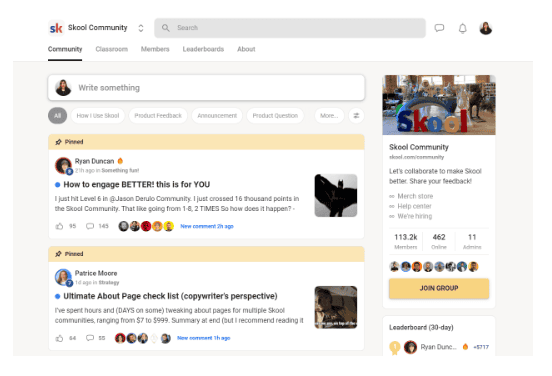How Digital Marketing Helps in Business Growth
In today’s digital era, having a solid online presence is essential for the success of any business. Gone are the days when traditional marketing methods like newspaper ads and flyers were enough to attract customers.
With more and more people turning to the Internet for their shopping needs, small businesses can no longer afford to ignore the power of digital marketing. But what exactly is digital marketing, and how can it help your business grow?
In this blog post, we’ll explore the world of digital marketing and its various strategies, which can help your small business thrive in this competitive market.
So sit back, grab your favorite beverage, and get ready to learn why implementing effective digital marketing techniques is crucial for your business’s growth.
What is the Power of Digital Marketing in Modern Business?
Digital marketing allows you to reach a vast audience with precision and efficiency. Through various online channels, such as search engines, social media, email, and content marketing, you can tailor your messaging to resonate with specific demographics and interests.
This targeted approach ensures that your marketing efforts are reaching the people most likely to engage with your brand and ultimately become loyal customers. It empowers you to build meaningful relationships with your audience, establish your brand as a leader in your industry, and achieve sustainable growth in the digital age.
What is Digital Marketing?
Simply put, digital marketing is any form of marketing that happens online. It includes things like search engine optimization (SEO), social media advertising, email marketing, and content creation. It’s about using the power of the internet to connect with your audience and achieve your business goals.
Think of it like this: digital marketing is your modern-day megaphone, allowing you to amplify your message and reach a wider audience than ever before.
How does Digital Marketing Compare to Traditional Marketing Methods?
| Aspect | Digital Marketing | Traditional Marketing |
|---|---|---|
| Cost- Effectiveness | Typically, it is more cost-effective due to targeted approaches and the ability to scale at a lower cost. | Often involves higher costs due to physical materials and broader reach. |
| Measurement | Results are easily measured and tracked through analytics, allowing for detailed performance reports. | Measurement is more challenging and often less precise. |
| Customer Interaction | Enables direct interaction with new and existing customers, providing immediate feedback and fostering a personal connection. | Interaction is generally less direct and can be slower. |
| Speed of Implementation | Campaigns can be deployed quickly, often in real time, allowing for immediate impact. | Requires more time for production and distribution. |
| Targeting | Highly targeted, with options to adjust campaigns based on customer behavior and preferences. | Broader targeting often based on assumptions of a general audience. |
| Reach | It can reach a global audience instantly. | Typically limited to a specific area or region, depending on the medium. |
By understanding these distinctions, you can leverage digital marketing to complement your existing strategies, ensuring comprehensive coverage and optimized growth potential. Remember, in the digital age, being adaptable and responsive to the changing landscape can significantly enhance your business success.
What are the Key Digital Marketing Channels?
Digital marketing encompasses a variety of channels, each with its unique strengths. Here’s a breakdown of the key digital channels you should consider:
Social Media
Platforms like Facebook, Instagram, and Twitter offer powerful ways to build a community around your brand. You can engage with your audience, share content that resonates, and run targeted ads to increase conversion rates.
Social media also allows you to gather valuable customer feedback and insights. Make sure to choose the right platform for your business and develop a solid social media strategy that aligns with your goals.
Email Marketing
Still one of the most effective digital marketing channels, email lets you deliver personalized messages directly to your customers’ inboxes. It’s excellent for nurturing leads and driving loyalty by keeping your audience informed about new products, updates, and content. With email, you can segment your audience and tailor content to their specific interests and preferences.
To make the most of email marketing, be sure to regularly clean your email list and optimize your subject lines, design, and call-to-action buttons for better open and click-through rates. You can also use automation tools to send automated emails based on triggers like a new subscriber or abandoned cart.
Content Marketing and Blogging
This strategy involves creating and distributing valuable content to attract and engage a clearly defined audience. Whether it’s blog posts, videos, or infographics, compelling content helps establish your authority and influence in your industry.
Blogs allow you to showcase your expertise in your industry, provide valuable information to your audience, and improve SEO by adding fresh content regularly. When creating blog posts, ensure they are well-researched and engaging to keep readers interested.
Search Engine Optimization (SEO)
SEO is the process of optimizing your website to rank higher in search engine results pages (SERPs). It involves incorporating relevant keywords, creating high-quality content, and building backlinks to improve your website’s visibility on search engines like Google.
By improving your SEO, you can increase organic traffic to your site and attract potential customers who are actively searching for products or services related to yours.
Pay-Per-Click (PPC) Advertising
This is an internet marketing model in which you pay a fee each time one of your ads is clicked. You’re essentially buying visits to your site rather than attempting to earn those visits organically. PPC ads appear at the top and bottom of a search engine results page, marked with an “ad” label.
PPC advertising is a popular form of online marketing that allows businesses to reach their target audience through targeted advertisements. Unlike other forms of advertising, you only pay when someone clicks on your ad, making it a cost-effective option for driving traffic to your website.
Utilizing these channels effectively can create a comprehensive digital marketing strategy that attracts and retains customers. As you dive deeper into each channel, remember that the key is integration and consistency across all platforms to maximize impact and growth.
Why Digital Marketing is Essential for Business Growth?
If you want your company to survive and thrive, you must be careful about its marketing. It will help you reach new customers, increase brand awareness, and boost sales. No matter what size your business is, it should rely on powerful marketing techniques so that you can reap all the benefits it can give you.
Let’s check out the main reasons why marketing is essential for business growth.
Building brand awareness
Your company’s products and services would go unnoticed without the strength of marketing. Working with reputable StoryBrand marketing agencies, like Creativeo Marketing Agency, will help you with many things, like implementing your StoryBrand, improving your public relations, advertising, and social media campaigns, all of which are very important for your success.
They will help you get your brand’s name out there and reach more interested people. When done well, branding can make your business stand out and establish a trustworthy reputation among customers, so you should engage in continuous and strategic branding to build brand recognition and strengthen your position on the market.
Knowing customers needs
The right marketing will help you understand what your customers need and want. Market research will allow you to learn more about their habits, tastes, and the latest trends that you need to follow to make yourself credible and trustworthy.
You can use this data to create personalized offers for your target audience that will make them feel valued and more inclined to work with you. Knowing who your customers are and what they want to see, hear, or get will also improve the effectiveness of your marketing.
Stronger credibility and trust
A key goal of effective marketing strategies is strong credibility and trust among customers. You can build a solid reputation to increase your company’s sales and word-of-mouth promotion with a consistent message, high-quality content, and good feedback.
It cannot be overstated how important it is that your customers trust you. They are the vital organs of your business and the path to success, so with the proper marketing campaigns, you will touch their hearts and minds and make them your loyal followers.
Also, strategies like influencer collaborations and content marketing can bolster your chances even more, especially if you work ethically and honestly. Building trust and credibility is the key to a loyal client base and a prosperous company.
Staying competitive
One of the most important things in business is staying competitive, as many similar companies are fighting for the trust of the same clients. So, you need something that can appeal to their tastes and make them loyal to you, and powerful marketing will help you achieve this goal.
You need to display your value proposition and distinctive selling qualities and regularly assess your competitors’ strategies and market trends to know what to offer, how to work, and how to approach your clients.
Finally, marketing is essential if you want your business to be successful and recognizable. You need to find the right strategies to appeal to your customers, boost your sales, and maintain a competitive edge. This will increase your chances of being successful and credible at all times.
Key Digital Marketing Strategies Driving Business Growth
Unlike old forms of marketing, digital marketing is a multi-faceted field, with various tactics working in tandem to achieve your business objectives. These strategies range from optimizing your website for search engines to engaging with your audience on social media.
Each plays a vital role in attracting, converting, and retaining customers, ultimately leading to sustainable business growth. Let’s explore some of these key strategies further.
Search Engine Optimization (SEO): Boosting Online Visibility
When potential customers search for products or services online, you want your business to be at the top of the search results. That’s where SEO comes in. It’s about optimizing your website and its content to make it more attractive to search engines like Google. The higher you rank, the more visibility you get, and the more likely people will click through to your site.
There are two main aspects to SEO: on-page and off-page. On-page SEO focuses on optimizing elements within your website, like keywords, content quality, and site structure. Off-page SEO involves building your website’s authority through backlinks from other reputable sites.
For businesses with a physical location, local SEO is crucial. It helps you show up in local search results and on platforms like Google Maps, making it easier for people nearby to find and visit your business.
SEO is a long-term game, but it’s a worthwhile investment. By improving your search engine rankings, you can attract a steady stream of organic traffic to your website, increasing brand awareness and driving sales.
Content Marketing: Engaging Your Target Audience
Content marketing is all about providing valuable, relevant information to your audience. It’s not just about selling your products or digital marketing services; it’s about establishing your brand as a trusted source of information and building relationships with potential customers.
Think of it this way: instead of interrupting people with traditional advertising, you’re providing them with content they actually want to consume. This could be blog posts, videos, infographics, or any other format that resonates with your target audience.
Once you’ve created great content, you need to get it in front of the right people. That’s where content distribution and promotion come in. You can share your content on social media, through email newsletters, or even run paid advertising campaigns to reach a wider audience.
The key to successful content marketing is consistency. Regularly publishing high-quality content will keep your audience engaged and returning for more. This builds trust and loyalty, which can ultimately translate into sales and long-term business growth.
Social Media Marketing: Building Brand Awareness
Social media platforms offer a unique opportunity to connect with your audience on a personal level. It’s where you can showcase your brand personality, share valuable content, and build relationships with potential customers.
But before diving in, it’s important to choose the right platforms for your business. Consider where your target audience spends their time online and which platforms align with your brand’s values and messaging.
Once you’ve chosen your platforms, it’s time to develop a content strategy. What kind of content will resonate with your audience? How often will you post? And how will you ensure your content stands out in a crowded feed?
Finally, remember that social media is a two-way street. It’s not just about broadcasting your message; it’s about engaging with your followers, responding to comments, and building a community around your brand.
Email Marketing: Nurturing Leads and Customers
Email marketing allows you to build direct relationships with your audience. It’s a way to deliver personalized messages, promotions, and valuable content right to their inbox. But first, you need to build an email list. This involves encouraging people to sign up through website forms, social media promotions, or offering incentives.
Once you have a list, segment it based on demographics, interests, or behavior. This allows you to send targeted emails that resonate with each segment, increasing engagement and conversions.
Crafting compelling email campaigns is key. Consider subject lines that grab attention, clear calls to action, and visually appealing designs. Keep your emails concise and focused, offering value to your subscribers.
Consider automating your email marketing to save time and streamline your efforts. You can set up welcome emails for new subscribers, trigger emails based on specific actions, and even create drip campaigns to nurture leads over time.
Email marketing may seem old-school, but it’s still one of the most effective ways to connect with your audience and drive results. By building a strong email list and sending targeted, valuable content, you can nurture leads, boost customer loyalty, and achieve sustainable business growth.
Measuring the Success of Your Digital Marketing Efforts
Implementing digital marketing strategies is only half the battle. To truly maximize your ROI, tracking and measuring their effectiveness is essential. Let’s delve into how you can do just that.
ROI of Digital Marketing: Proving Business Growth
One of the most significant advantages of digital marketing is its measurability. Unlike traditional methods, where tracking results can be challenging, digital marketing campaign provides concrete data on impressions, clicks, conversions, and more. This allows you to see exactly what’s working and what’s not so you can refine your strategy and maximize your ROI.
Calculating the return on investment for your digital marketing efforts is essential. By comparing the cost of your campaigns to the revenue they generate, you can see the tangible impact on your bottom line. This data-driven approach also allows you to compare the effectiveness of digital marketing to traditional methods, often revealing the superior ROI of digital strategies.
The benefits of digital marketing extend far beyond immediate results. By consistently investing in these efforts, you build brand awareness, cultivate customer loyalty, and establish a strong online presence. This translates to long-term growth and sustainable success in the digital age.
Overcoming Common Digital Marketing Challenges
Even with the best strategies, digital marketing isn’t without its obstacles. Let’s tackle some of the most common challenges you might face:
Budget Constraints
Finances are always a consideration, especially for smaller businesses. The good news is that digital marketing offers flexibility. You don’t need a massive budget to get started; focus on high-impact tactics that align with your goals. By tracking results and adjusting your strategy, you can maximize every dollar spent.
Keeping Pace with Change
The digital world evolves at lightning speed, and it’s essential to stay ahead of the curve. New platforms emerge, algorithms change, and consumer behavior shifts. Dedicate time to ongoing learning, whether it’s reading industry blogs, attending webinars, or experimenting with new tools. Remember, adaptability is key.
Managing Your Online Reputation
In the age of social media, customer feedback can make or break your brand. It’s crucial to monitor online reviews and engage with your audience, both positive and negative. Addressing concerns promptly and professionally shows that you value customer relationships and build trust.
Digital marketing is a journey, not a destination. It’s about continuous learning, adapting, and refining your approach. Embrace the challenges, celebrate the victories, and never stop exploring new ways to connect with your audience and grow your business.
Integrating Digital Marketing with Overall Business Strategy
Digital ad strategy and the whole marketing itself shouldn’t be an isolated effort; it needs to be seamlessly integrated with your overall business strategy.
- Align your digital marketing goals with your broader business objectives. Whether it’s increasing brand awareness, generating leads, or driving sales, ensure your digital efforts are working towards the same overarching goals.
- Create a cohesive approach that spans both online and offline channels. Your brand message should be consistent across all touchpoints, from your website and social media to your physical store or events.
- Invest in training your team on digital marketing best practices. Empower your employees to become brand advocates and leverage digital tools to connect with customers and achieve business goals.
Final Thoughts on Your Digital Marketing Efforts
Digital marketing is no longer optional for businesses aiming for growth in today’s market. Thus, it’s time to level up your business game and embrace the digital marketing world.
It’s not just a trend or a fad but a necessary tool for any business that wants to thrive in today’s market. From social media to email campaigns, SEO to content marketing, these strategies can help you reach new heights and connect with your audience in ways you never thought possible.
So don’t be left behind; jump on the digital bandwagon and watch your business take off like a rocket ship. And who knows, maybe one day you’ll be giving your own expert advice on the topic!
Remember, the key is to stay authentic and unique in your approach – because the world of online marketing is constantly evolving and only those who are bold enough to stand out will truly succeed. Trust us, you’ve got this!
Now, go out there and conquer the digital landscape with confidence and enthusiasm. Your success awaits!







